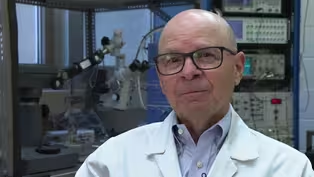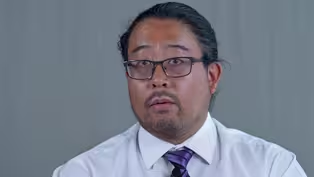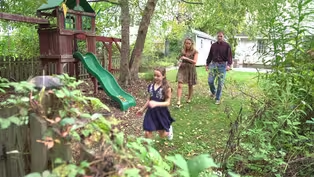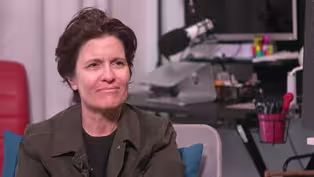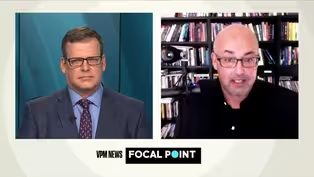VPM News Focal Point
AI, implants & smell: Dr. Daniel Coelho, VCU Health
Clip: Season 2 Episode 17 | 9m 2sVideo has Closed Captions
Dr. Daniel Coelho discusses deep brain stimulation research
This is an in-depth interview with Dr. Daniel Coelho of Virginia Commonwealth University. The interview about his research on olfactory-implant systems to help those afflicted with the loss of smell is part of VPM News Focal Point’s look at the larger issue of computer-assisted medicine and the future of artificial intelligence in health care.
Problems playing video? | Closed Captioning Feedback
Problems playing video? | Closed Captioning Feedback
VPM News Focal Point is a local public television program presented by VPM
The Estate of Mrs. Ann Lee Saunders Brown
VPM News Focal Point
AI, implants & smell: Dr. Daniel Coelho, VCU Health
Clip: Season 2 Episode 17 | 9m 2sVideo has Closed Captions
This is an in-depth interview with Dr. Daniel Coelho of Virginia Commonwealth University. The interview about his research on olfactory-implant systems to help those afflicted with the loss of smell is part of VPM News Focal Point’s look at the larger issue of computer-assisted medicine and the future of artificial intelligence in health care.
Problems playing video? | Closed Captioning Feedback
How to Watch VPM News Focal Point
VPM News Focal Point is available to stream on pbs.org and the free PBS App, available on iPhone, Apple TV, Android TV, Android smartphones, Amazon Fire TV, Amazon Fire Tablet, Roku, Samsung Smart TV, and Vizio.
Providing Support for PBS.org
Learn Moreabout PBS online sponsorshipDANIEL COELHO: I am the Douglas Hayden Professor and Vice Chair for Research in the Department of Otolaryngology/Head and Neck Surgery.
Well, a long time ago, Rich, who is a member of the department, reached out to me and said, "It's so great that you as a cochlear implant surgeon are able to help people and restore their sense of hearing."
Whereas he'd been spending his whole career, and unlike many of the other senses, there haven't been great solutions for people with loss of smell.
And I said, 'Yeah, it would be great if we could develop that kind of technology, but there are certain limitations.'
At least there were in terms of my understanding of olfaction and smell physiology.
But then we started talking, and a good collaboration started and we started talking about, well, how do we address some of these issues?
And some of them were, obviously, huge gaps in my knowledge about how the sense of smell works, which I've since learned a lot.
And likewise, Rich has a very strong understanding in electrophysiology and stimulating for sensory research.
So it was very quick for him to pick up on my understanding of cochlear implants.
So it took me longer to learn his stuff than it took him to learn my stuff, but I think it made for a nice collaboration.
So cochlear implants have been around for almost 40 years, and there's been a lot of improvements and refinements, both in terms of surgical technique, in terms of stimulation paradigms, in terms of patient candidacy and our understanding of the factors that contribute to improved outcomes.
So by using everything that we've learned over the course of the past four decades from cochlear implants, we can avoid some of those hurdles when applying essentially similar type technology just for a different end point stimulation.
So the idea behind it is, in theory, quite simple.
It's an odor detector paired with a processor that when it receives odor A, the processor will say, "Okay, that's odor A," and now it sends out a unique stimulating pattern to an electrode that then touches on the important parts of the brain that encode for smell.
And when odor B comes in, a different, you know, fingerprint, as it were, digital fingerprint, would be sent to that part of the brain, and the patient would detect something different.
It's really exactly the same thing that is true for hearing, which is, you know, by far and away, the world's most successful, you know, neural prosthetic.
So the physiology is a bit different.
That's one.
The ear, the organization of the inner ear, is a little bit more straightforward in terms of how it's organized.
It's very linear in terms of different frequencies, or we know exactly where certain frequencies are within the cochlea, but up until relatively recently, we didn't really understand what part of the nose and the olfactory brain, which is right above the nose, encodes for what.
It turns out, there is a map, as well.
Previously we were unaware of any kind of map, but research, some of which led to the Nobel Prize about 10 years ago, really helped us understand that we can exploit this map of odorants and sensations better.
Loss of smell is very bothersome for patients, but it's not something you hear a lot about in the lay press.
And part of that is because it's not easy to illustrate that.
But if you talk to patients who have lost their sense of smell, they're incredibly distressed.
I have a sense of smell, and I always think to myself, 'Well, you know, if I had to lose a sense, I guess a sense of smell wouldn't be so bad.'
I, I kind of take it for granted; I think we all do.
So we're constantly in contact, and Rich, through his 30 or 40 years through the Smell and Taste Clinic, have encountered patients who seem incredibly distraught from their loss of sense of smell.
And you don't really realize, I think these patients themselves didn't realize, how much it bothers them until it actually does.
Sense of smell is, perhaps more than any other sense, really linked to mood and cognition and memory.
So it's not just about being able to tell the difference between a Merlot versus a Cabernet Sauvignon.
It's really much, much more profound connections that are happening inside the brain.
As far as the technology goes, just look at your computer, look at your cell phone.
Technology is increasing at exponential rates over the course of the past several decades: everything from miniaturization to specifically for this, odor detection, to electrode stimulation parameters to the materials that we're using.
It really is the time really wasn't ripe for this technology until relatively recently.
I think there are many potential results that can come out of this research.
In fact, for us, that's one of the most exciting things about research, is not necessarily getting the thing you expect; it's about getting the thing that you don't expect.
And when it comes to smell, as I've mentioned, the sense of smell is so closely related to mood and cognition and memory that it's quite possible that although our initial goal is to restore a sense of smell so people can appreciate food and drink and perfume and from a safety point of view, be able to detect you know, noxious fumes, issues like that, but because smell is so closely linked to memory and mood and cognition, that it's possible the ultimate application of this technology may go far beyond and may address things like dementia, may address things like memory, may address things like mood.
I think with each passing year, we realize how little we know.
The more you realize there's the known unknown and there's the unknown unknown, and I think the more that we learn, the more we realize that we're just scratching the surface.
It's a certainly exciting time.
I think we know so much more than we knew 50 years ago, but I suspect that 50 years from now we'll look back and think of these as the Dark Ages in terms of understanding neural processing.
You're not alone.
A lot of patients.
We've done a fair amount of epidemiologic work and the prevalence of loss of smell, particularly severe loss of smell, is quite large.
COVID didn't help in this regard, though it did shine a spotlight on this condition.
And there are literally tens of millions of patients across the world who could benefit from this type of technology, only from a smell point of view.
And although we have a few years to go until our first in-human trials, we're going strong and really looking forward to addressing that problem.
We're in a bit of a revolution now of wearable technology, and we see this as no different.
We'd like this to be something that's wearable.
And, of course, with technology and with miniaturization, we expect this all to get better.
You know, in the early days of cochlear implants people would have to walk around with these large boxes, and now everything is completely self-contained on a small, little thing the size of a half dollar on your head that doesn't even sit on your ear.
And we anticipate that type of progress.
We're aware that Rome wasn't built in a day, and that the first incarnation of this device may not be a perfect replication of smell, but that's okay.
In the earliest days of any technology, it's never perfected.
We just want to be able to be able to do some level of discrimination between pleasant versus unpleasant.
And then over time, we'll learn a lot from doing this, just as with, within my field, cochlear implantation, we've learned a fantastic amount over the course of the past four decades that have really helped us push the technology forward.
Think of it almost more from sight.
Probably sight or hearing would be a easier analog, is to say that if somebody's blind, the first step would be great if you can get them crystal clear, 20-20 vision, but first you start with light versus dark, then you start with shades of gray, and then you maybe work into color and resolution and things like that.
And the same is true for smell.
You maybe at first say, "That's floral," versus, "That's more acrid."
And with time, we would hope to be able to differentiate between, you know, within each group.
AI and olfactory-implant systems: Dr. Richard Costanzo, VCU
Video has Closed Captions
Clip: S2 Ep17 | 7m 33s | Dr. Richard Costanzo discusses deep brain stimulation research about the sense of smell. (7m 33s)
Artificial intelligence: What are the risks and benefits?
Video has Closed Captions
Clip: S2 Ep17 | 7m 46s | What does a future with artificial intelligence look like? We examine risks and benefits. (7m 46s)
Video has Closed Captions
Clip: S2 Ep17 | 2m 12s | Artificial intelligence is proving useful for medical breakthroughs (2m 12s)
Deep brain stimulation and disease: Dr. Paul Koch, VCU
Video has Closed Captions
Clip: S2 Ep17 | 10m 58s | Dr. Paul Koch discusses deep brain stimulation research and the treatment of disease. (10m 58s)
Epilepsy treatments: Dr. Kenichiro Ono, VCU Health
Video has Closed Captions
Clip: S2 Ep17 | 3m 17s | Neurologist Dr. Kenichiro Ono discusses deep brain stimulation and treating epilepsy. (3m 17s)
Is technology overuse hijacking our children’s brains?
Video has Closed Captions
Clip: S2 Ep17 | 3m 18s | A Chantilly, VA teacher says technology overuse is making kids less intelligent. (3m 18s)
Tech journalist and podcast host Kara Swisher talks about AI
Video has Closed Captions
Clip: S2 Ep17 | 19m 7s | Tech journalist and podcast host Kara Swisher says AI "can be a weapon but it’s a tool." (19m 7s)
Technology Expert on the Biggest Threats to Democracy
Video has Closed Captions
Clip: S2 Ep17 | 13m 36s | Expert says AI, fake news and social media are not the biggest threats facing democracy. (13m 36s)
Virginia Is The World’s Data Center Hub - What’s The Cost?
Video has Closed Captions
Clip: S2 Ep17 | 4m 37s | Most of the world’s internet data flows through Virginia. What do more data centers mean? (4m 37s)
Providing Support for PBS.org
Learn Moreabout PBS online sponsorship
- News and Public Affairs

Top journalists deliver compelling original analysis of the hour's headlines.

- News and Public Affairs

FRONTLINE is investigative journalism that questions, explains and changes our world.












Support for PBS provided by:
VPM News Focal Point is a local public television program presented by VPM
The Estate of Mrs. Ann Lee Saunders Brown
